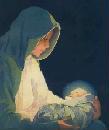A Meditation on Luke 1:19-55
We call it "The Song of Mary," the Magnificat, and so often consider it a song of triumph: "My soul magnifies the Lord . . . ." I suggest another way of hearing it, not as a song of triumph but as a cry of pain, the pain of the poor and helpless of the ages of human history, those who have been left on the doorstep, unwanted little ones, treated as non-persons, less than others, like Mary, the mother of Jesus.
And Mary was a woman, a young woman, no doubt hardly more than a girl, probably younger than those young women who lost their lives in what we've come to call "the Montreal massacre."
It was December 6, 1989, a young man named Marc Lepine deliberately shot and killed 14 women at l’Ecole Polytechnique, Montreal, Canada. He deliberately chose women, excluding men. December 6th is still remembered as a National Day of Remembrance and Action on Violence Against Women.
The years pass and the media moves on to other more immediate tragedies, but at the time the event burned itself into the collective consciousness of the nation.
We are becoming more aware, uncomfortably aware, of the abuse of women by men; some refer to “the war against women.” Women, though they do not live always in fear, know that they must live with a certain level of care beyond that of men, careful not to walk in a park at night, or to be seen in a compromising situation with a man. The reasons are evident in the crime statistics. One of every four Canadian women will be sexually assaulted during her lifetime, experts claim. On average, three sexual assaults are reported every hour
One recalls with shame the way men used too talk of “making girls.” Now it is recognized as sexual assault, “date rape.” One hears, with a degree of incomprehension, reports of me statements that reveal contempt for women, even hostility.
We know, deep, deep down, that all this is not just recent or local, not something sociological or peculiar to Canada in the late twentieth century. It has been, and is, no doubt, even more deeply imbedded in other places and other times. We know that it has something to do with all men and women who ever lived, including you and me.
W. H. Auden, in his Christmas Oratorio,
For the Time Being, imagines Joseph hearing that Mary, his intended wife, is pregnant by God the Holy Spirit. Auden imagines Joseph trying to understand and accept this. He is told that he, a man, is being placed in that position of passivity and tolerance in which men have placed women down through the ages.
For the perpetual excuse
Of Adam for his fall -- "My little Eve,
God bless her, did beguile me and I ate,"
For his insistence on a nurse,
All service, breast, and lap; for giving Fate
Feminine gender to make girls believe
That they can save him, you must now atone,
Joseph, in silence and alone.
While she who loves you makes you shake with fright,
Your love for her must tuck you up and kiss good night.
For likening Love to war, for all
The pay-off lines of limericks in which
The weak resentful bar-fly shows his sting,
For talking of their spiritual
Beauty to chorus-girls, for flattering
The features of old gorgons who are rich,
For the impudent grin and Irish charm
That hides a cold will to do harm,
Today the roles are altered: you must be
The Weaker Sex whose passion is passivity.
For those delicious memories
Cigars and sips of brandy can restore
To old dried boys, for gallantry that scrawls
In idolatrous detail and size
A symbol of aggression on toilet walls. . . .
For having said,
"no woman has a business head!"
You must learn now that masculinity,
To Nature, is a non-essential luxury.
No doubt, some men are more guilty than others. But each one of us who is a man, shares in some sense and to some degree, the reason why the girl Mary voiced her cry of oppression and her expectation of justice.
This whole issue is not just a "women's issue." The solution involves us all. We are learning, sadly, what a deceptive half-truth was Pierre Trudeau's dictum that "the government has no business in the bedrooms of the nation." Two women a week die at the hands of a current or former husband or lover.
Questions regarding our sexual identity, relationships and roles, can never be just "women's issues," or men's either. Whether questions of equality in employment or equal rights in marriage, problems of sexual harassment or violence against women, or the question of abortion, recognizing how women have been victimized, neither men nor women should ever say that these are only women's issues.
For what is involved is the value of human life -- whether a person who is a woman, or a child, or black, or poor, or old, or unborn, or native, or immigrant. And the value we place on the life of another is the value we place on our own life. And if our society, our government and our national institutions do not value the lives of all our people, then our own life, liberty and right to happiness and security are imperiled.
Let us pray for the day when the words of the prophet Zephaniah may be the expression of rejoicing of us all:
Sing aloud, O daughter of Zion;
Shout, O Israel!
Rejoice and exult with all your heart,
O daughter of Jerusalem!
The Lord has taken away the judgments against you,
and has cast out your enemies.
. . . The Lord is in your midst,
and you shall fear evil no more.
(Zephaniah 3:14f.)























